Hi friend,
In the newsletter a couple of weeks ago I wrote about something that struck a chord with the community: fear. I wrote about how the events of my life have trained me to expect the worst, but if I let fear be the driver, I’ll never make plans, I’ll never take risks. I’ll always stop myself from dreaming about the future. I want to find ways to delight in the mystery of how things unfold, I said, even when it’s far from ideal, and to trust that facing my fears will bring me exactly what I need.
I’ve been thinking ever since about how this has been playing out in my life in the form of a senior rescue dog named Lentil. I got her on a whim back in March, when Jon and I were in Los Angeles for the Oscars—our documentary, American Symphony, had been nominated. My ritual any time I travel is not to look for cool restaurants or tourist attractions but to stalk that city’s adoptable pet listings. I had never acted on it—it was just a ritual. But this time, I was scrolling and came across a seven-pound, eight-year-old Mexican hairless dog named Lentil in need of adoption. I had a strong intuitive reaction when I saw her little grizzled muzzle and otherwise naked body. I sent the listing to Jon and asked if we could foster her for the weekend. It made absolutely no sense given everything we had in our schedule, but he told me to go for it.
So rather than do whatever it is people do to prepare for the red carpet, I left my hotel at dawn and drove an hour to pick her up. Maybe because my adult life has been full of the most bewildering highs and lows, I delighted in the fact that she was going from a shelter in Bakersfield to the Chateau Marmont. Jon was still asleep when I returned, so I plopped her in the bed to see if he would find her as absurdly adorable as I did, or if he would scream in terror at this little alien meerkat. His response was somewhere in between. A couple hours later, an airline-approved dog carrier arrived—I had ordered it just in case. Jon took one look and said, “A trial?” And spoiler alert: She did in fact come home with us.
To return to the subject of fear: After I lost my beloved dog Oscar during my second bone marrow transplant, I felt the instinctive need to guard against more loss. When I did finally get to a point where I could entertain the idea a new pup, I chose young dogs—River was only a year old, and Sunshine was a mere eight weeks. I was trying to experience as little grief as possible for as long as possible, so a senior dog like Lentil was not something I was open to. Also, as much as I love dogs and Frida, xolos and other breeds of the hairless variety had always been a hard line for me. But that changed soon after I met Lentil. When Jon and I were fostering her, I asked him, “Is she too ugly?” and he said, “Maybe.” But now we think she’s the most beautiful creature we’ve ever seen—so elegant, poised, and sphinx-like.
Over the last decade, one of my most dominant fears has been falling in love only to lose again. But new love has been an important part of healing from the grief of loss, and it’s provided other healing that I didn’t even know I needed. Like with Lentil, when I got her, I didn’t imagine I’d be reentering intensive treatment again, but because of her age and hairlessness, she wants nothing more than to lie in bed with me all day long, swaddled in blankets and heating pads—with her at my side, what starts as a bad day often becomes a delightfully cozy one.
There is such a sweetness to Lentil’s slowness, and I want her to feel loved and safe and comfortable, to meet her wherever she is. It’s almost a mirror for how I need to take care of myself right now. When Lentil is tired, I think, Time to wrap you in your favorite blanket, and I give myself license to do the same. The ancient Aztecs believed xolos to be sacred, with magical healing properties—that they could sense disease and would dispel it by snuggling close. Lentil has lived up to the myth of her breed, maybe not as a disease warder, but as a canine hot water bottle, my weird little naked dog-nurse. I don’t worry about how long she’ll be here. I’m just so happy she’s here right now.
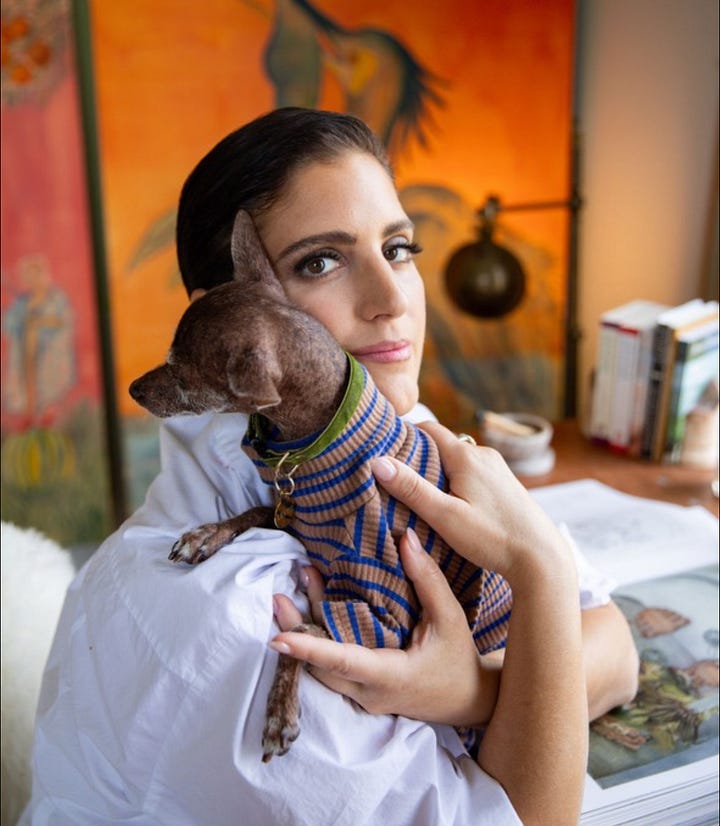
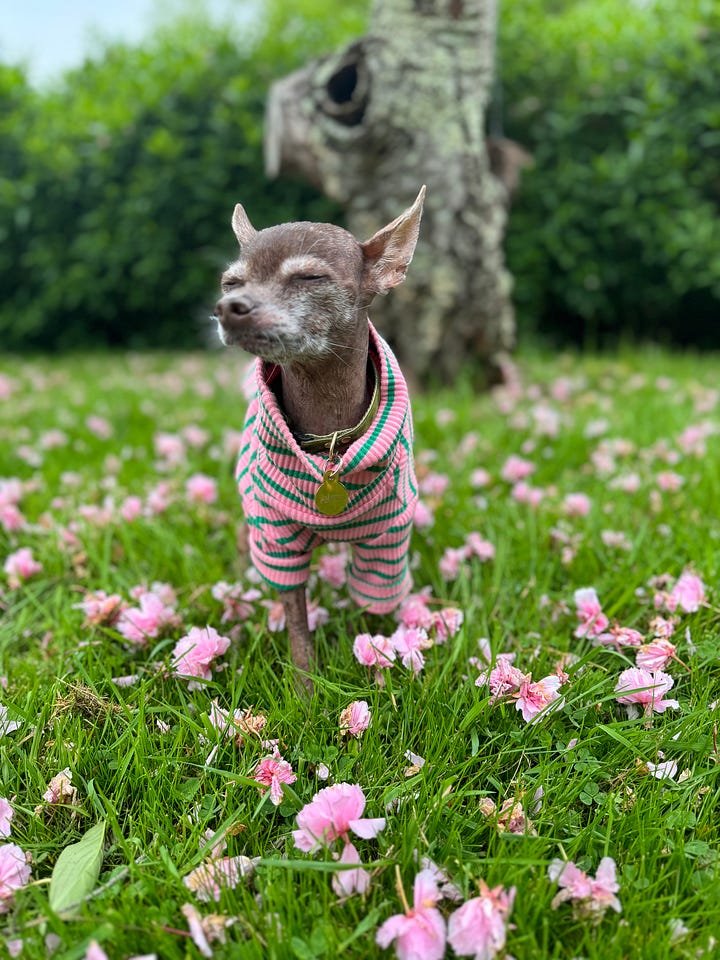
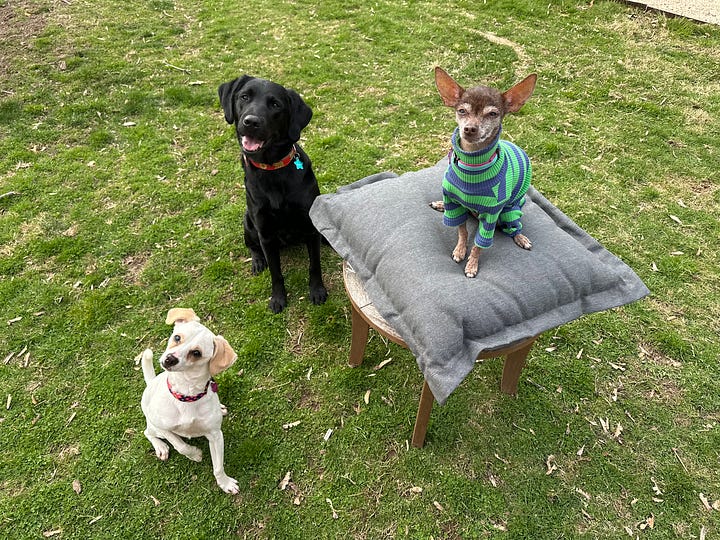
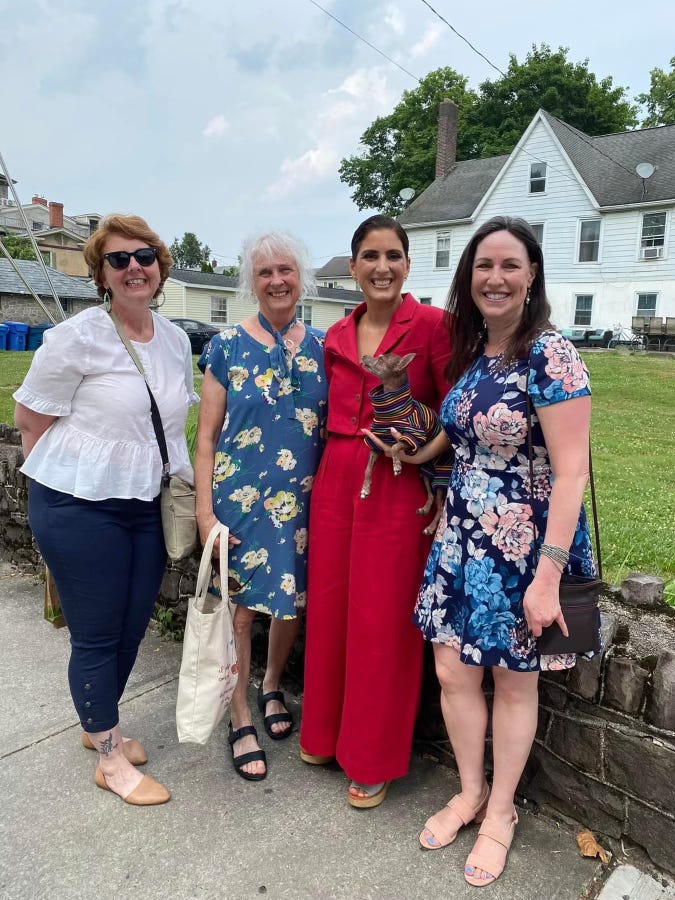
With that ode to Lentil penned, I want to turn now to today’s guest essay and prompt, called “Yes” by Na Mee—it’s a story of adoption, both her own and that of a dog named Bear. I first came across this piece online, and it was so perfectly crafted and layered and poignant that it made me weep. So I dashed off a little note to Na Mee, and I asked her if I could share it with this beloved community. To my great joy, she graciously said yes. Please read on for one of the most beautiful essays I’ve ever read.
Sending love and lentils,
Suleika
An Item of Note—
Mark your calendar! We’ve scheduled our next meeting of the Hatch, our virtual creative hour for paid subscribers for Sunday, November 17 from 1-2 pm ET. It such a beautiful way to spend an hour of your Sunday—reading, reflecting, writing (or drawing or painting), and connecting. I hope you can join us!
Prompt 310. Yes by Na Mee
Actually, I said no to adopting Bear. My son found him on Petfinder and fell in love with his floofball smile, but I knew akitas were fiercely independent and difficult dogs to train. He’s cute but I don’t think he’s a good fit for us, I said, and eventually Bear’s listing disappeared.
When he re-appeared on our search months later, I called the shelter. We could visit, I thought, and maybe make a good impression. Then, if Bear wasn’t right for us, and he probably wasn't, they would keep an eye out for future dogs.
Bear had been there—a no-kill shelter—for two years. His original family gave him up, and then the next family gave him up, and then the original family came back and adopted him, and then gave him back up again. Naturally his biggest issue is that he has severe separation anxiety, they said. So you’d have to be willing to take that on.
I don’t really know what that means, I said, drawing circles on my scratch paper, but I can learn.
For a dog, severe separation anxiety does not mean they can’t be alone so much as it means they panic when someone they thought would never leave, leaves. In his last home, Bear chewed off a doorknob.
In my first family, not even my mother was home when she gave birth to me. She had snuck away to Busan, the furthest place a Korean can go before they walk into the ocean. Almost two months later, she agreed to let my father take me to an orphanage. My intake paperwork says that I was cute. The physician wrote that I was “probably adoptable.” I went from an orphanage to a foster family to an airplane to America to an American family. Everyone I ever knew in Korea left, including me.
They say I cried the entire way, which is fourteen hours, which is a long time to tread water. Sometimes, even now, I drown in the wake of a goodbye. I know, and Bear knows, that some people never return. I too can be alone. And, I too have tried to pry open the last door someone walked through.
Six months before I met Bear, my father (who adopted me) unexpectedly died. When grief appears on your doorstop, it brings everyone it knows. All my goodbyes bobbed at the surface.
Came in waves
LeftWe met Bear. Bear did not care if you pet him. A puppy jumped on Bear’s face. Bear didn’t flinch. We threw a ball; we offered treats; he walked away. My son wanted Bear, because he was soft and new and possible. I wanted Bear, because I recognized him, or I’d forgotten him, or both. I felt Bear and I felt the doorknob in my teeth and I said yes.
We signed the adoption paperwork. We gathered Bear’s belongings, which was nothing, so we gathered his adoption supplies, which was a pillowcase of shelter donations. Every single dog in the shelter was barking. I sure hope this works out for you, the shelter director said, stapling my receipt.
Over the next few weeks at home, we learned that—in addition to the severe separation anxiety —Bear did not know how to walk on a leash and he did not come when called and sometimes he growled if you got near him. He lunged at almost all dogs, played rough with some dogs, played rough with some humans if he thought you were a dog, lunged at some humans if he didn’t like some unknown thing about you, hated cats including ours, and, worst of all, was not afraid to bite.
What did we get ourselves into? my adopted brother quotes what my new family was thinking, miming a baby in his hands and remembering my first twenty-four hours in America. They say I cried when I got off the plane and I cried when I was placed in my new mother’s arms. I cried when we left the airport, when we went to a hotel, when we checked into the hotel, when everyone in the hotel was trying to dream.
Bear is a good dog. Also, he was, to be fair, quite bad.
He changed my life. We had nowhere to go but up. Several books, hundreds of hours of video, many specialists and multiple trainings later, one of my biggest takeaways is that a dog learns what it practices, but they can only practice one small step at a time. Set them up for an easy win, mark it with a word (yes), and give them a reward. Then, micro build from there.
For example, to cure separation anxiety: I’d open the door, close the door, say yes, then reward. Then I’d walk outside, walk back inside, say yes, and reward. Then I’d walk outside, wait one second, walk back inside, say yes, and reward. Again, this time waiting for two seconds. Again, this time waiting for five seconds. Etc. This is how Bear slowly learned that I could leave, and I would return. That he was safe. That he'd survive alone.
In the waves of my own grief, I would open a door on a Monday and walk through it on a Thursday. Entire weeks, months jumped on my face, but I don’t remember them. My therapist suggested that I try to notice things that were neutral to mild. Not good things. Not wonderful things. Just easy things like, This toast is okay. Or maybe, I'm exhausted, so I'm going to lay on the floor, and it feels alright to lay on the floor. The object of the game wasn't for everything to be better, just observable, just… bearable.
They say you don’t adopt the dog you want, you adopt the dog you need. Bear is not perfect, and he never will be, but boy have we come a long way. We started at one second, then two seconds, and now I can leave him alone for four to six hours. He knows over fifty words; he can bow and touch and jump onto boulders on command. He was not naturally affectionate so I taught him to cuddle and to kiss and one night when I was crying I got out the treats and taught him to put his head on my shoulder any time he heard me sniffle.
I noticed him spin in the rain, I noticed him wait in the sun, I noticed us changing. Training Bear trained us both to sit in a world of loss and stay in it, two seconds more at a time. Again and again, Bear made me come home to my goodbyes. And, home to my hellos, to new beginnings, new ways of being.
I’ve trained him to walk on a leash without dragging me. I’ve trained him to walk off a leash and return to me. But, the best command is heel.
Heal, I’ll say, and this means we walk next to each other.
Every dog trainer will tell you, timing is everything.
One second, two seconds
the yes
the reward
Your prompt for the week:
Write about someone who is imperfect—be it a human or a pet—but whom you love anyway. What have they taught you about acceptance, patience, and love’s capacity? How are they a mirror for your own perfectly imperfect self?
If you’d like, you can post your response to today’s prompt in the comments section, in our Facebook group, or on Instagram by tagging @theisolationjournals. As a reminder, we love seeing your work inspired by the Isolation Journals, but to preserve this as a community space, we request no promotion of outside projects.
Today’s Contributor—
Na Mee is a storyteller and teaching artist. She wants her work to make you feel at home with yourself, with others, and with the world. A 2024 PEN America Emerging Voices fellow, a Kundiman fellow, and three-time Rasmuson Foundation Award recipient, she has received an Alaska Literary Award and her memoir-in-progress is currently shortlisted for a 2024 Granum Prize. Kundiman, VONA, Hedgebrook, Storyknife and others have generously supported her work. She is grateful for places like AGNI, Lit Hub, Feminist Review, Washington Square Review, The Rumpus, and others for taking good care of her stories and giving them homes. She lives and loves with her family on Lingít Aaní (Tlingit land, aka Juneau, Alaska). Find her @tsu_namee or at www.tsunamee.com.
For more paid subscriber benefits, see—
Haunted by Heartbreak, an installment of Dear Susu where I answered a letter from a community member about moving on after lost love and alchemizing regret
On Conflict and Peace, an interview with the conflict resolution expert Priya Parker about the reasons we find ourselves drifting apart, how we come together, and how the art of gathering can inspire our work and improve our lives
Letters from Love, a video replay of my workshop with the brilliant Elizabeth Gilbert, where she shared the transformative spiritual practice she’s used for twenty-five years to combat self-criticism and to access an ocean of unconditional love
Our Isolation Journal No. 1—
If you’re looking for a fresh start for fall, treat yourself to our custom journal! It has all of our favorite features: the perfect size to tote around wherever you go, ink-bleed proof paper, and numbered pages for easy indexing—and for extra inspiration, we printed our Isolation Journals manifesto on the flyleaf. Get yours by clicking below!

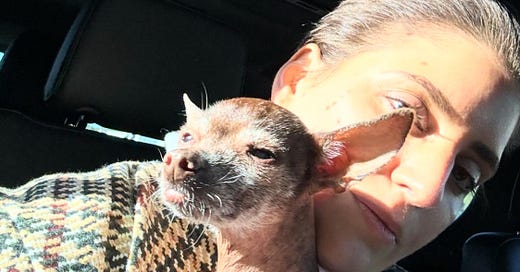



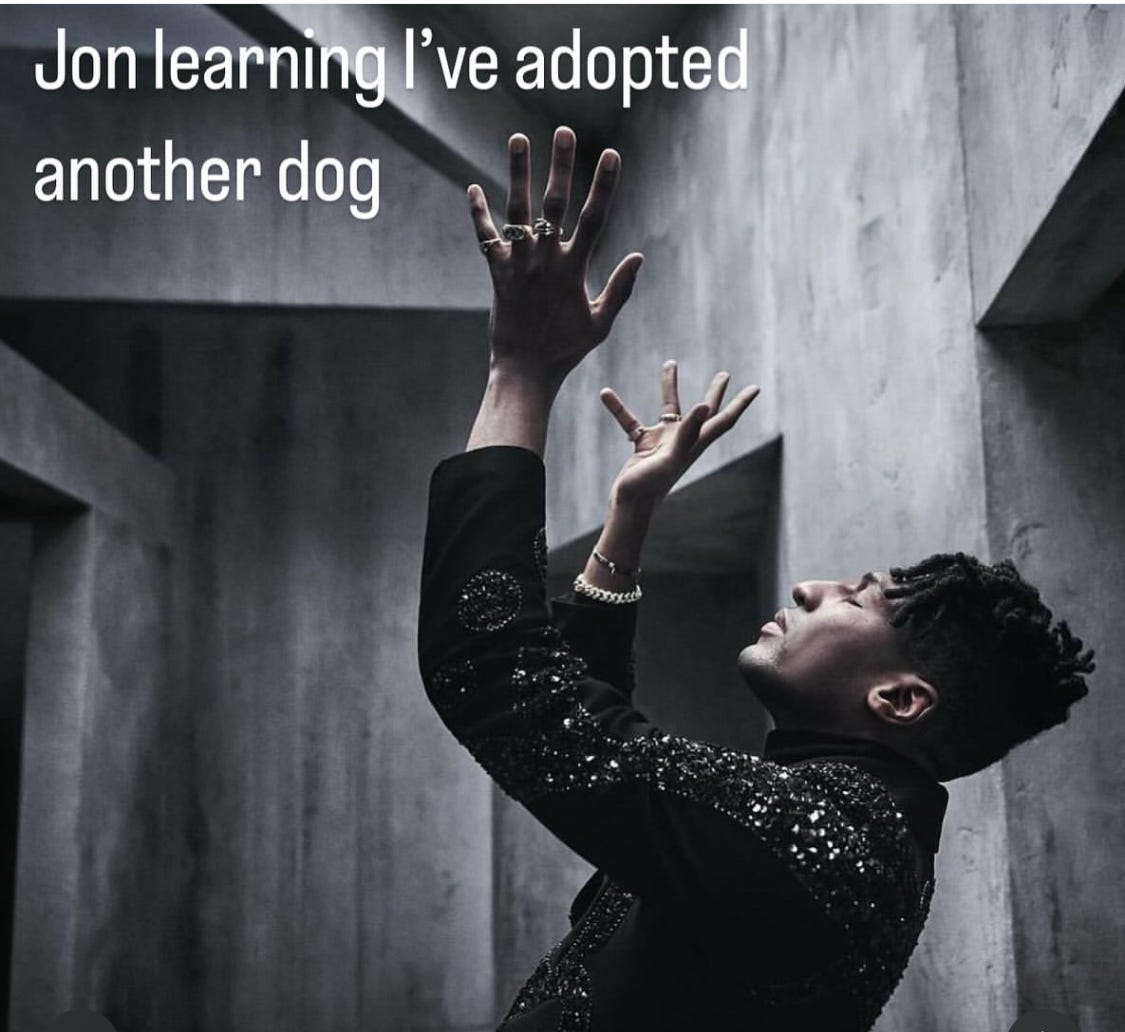


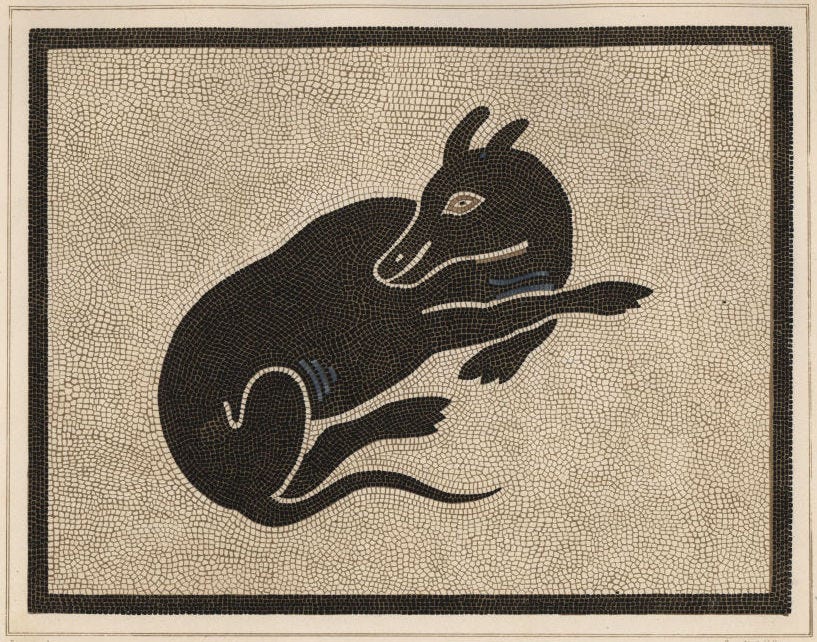


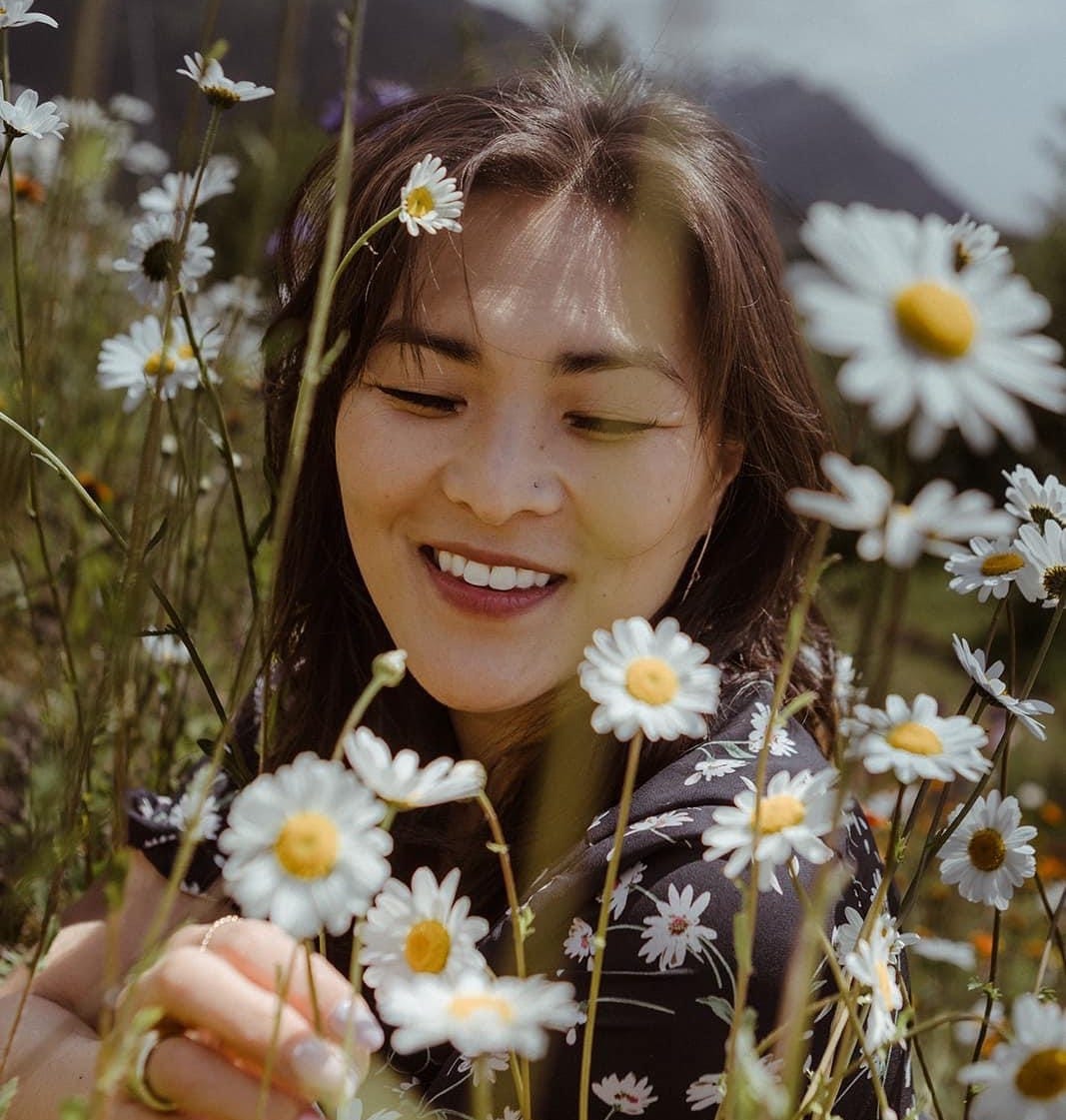


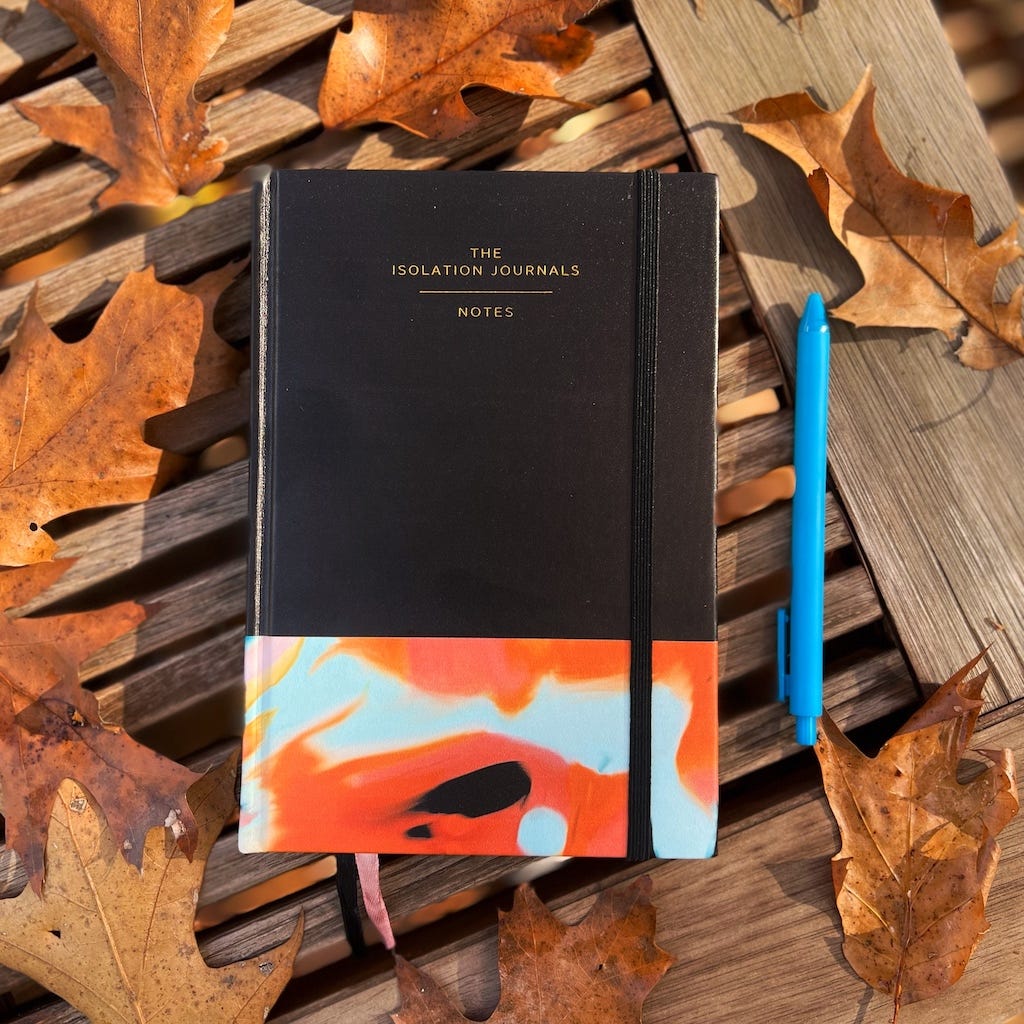
More and more I believe we are all of us day by day imperfectly rescuing one another. Thank you for these beautiful examples.
What a wonderful essay. Thank you!
"In my first family, not even my mother was home when she gave birth to me."
This sentence tore me apart. I've been a mom since February and the idea of being home to this little creature is wonderful and scary at the same time.
Sometimes, I fall into the comparison trap that social media so easily sets. Being a tired mom who feels overwhelmed now and then makes it easy to get caught up in it all. I’m currently learning to celebrate and appreciate the imperfections of life again — as a mom, I’m far from perfect but I am a safe, loving home for my daughter, where I will always accept her just as she is.
The morning of my high school graduation, there was a note from my mom on my lunch box in the kitchen that said, “We only expect you to breathe.” I carried that little note with me for a long time, and at 36, I still think about that message. It gave me so much strength. Growing up, I often thought love for me was conditional on being nice, pretty, and well-behaved. That note reminded me I was truly loved unconditionally.
I want to give my daughter exactly that feeling from the beginning — a feeling I only fully realized later. I will always be proud of her in this wild, little, imperfect world.